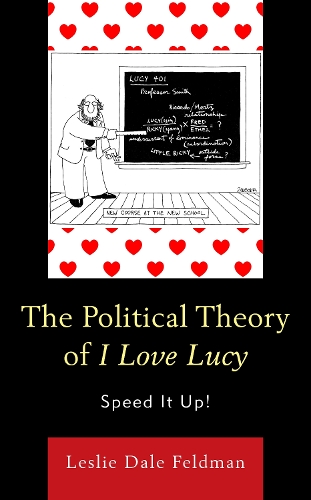
The Political Theory of I Love Lucy: Speed It Up!
(Hardback)
Publishing Details
The Political Theory of I Love Lucy: Speed It Up!
By (Author) Leslie Dale Feldman
Bloomsbury Publishing PLC
Lexington Books
18th January 2019
United States
Classifications
Professional and Scholarly
Non Fiction
Television
Politics and government
791.4572
Physical Properties
Hardback
184
Width 161mm, Height 228mm, Spine 19mm
408g
Description
This book looks at how the classic television series fits into the cultural milieu of mid-century America. I Love Lucy incorporates key themes of the 1950s American political scene and classic American values of family, social mobility, community, individualism and work, keeping in mind that Luck as Machiavelli said is the arbiter of half of what we do. As the beloved American TV queen, Lucy Ricardo is a psychologically complicated character, conflicted between her role as a 1950s housewife and her wish to be a star. She is an icon of social mobility, going from a small New York City apartment to a country house in a swanky suburb, and an example of the transitional woman who wants to have it all. Is she a feminist Is she a conformist Does she prefer the country to the city Whether she is working on the chocolate factory assembly line, baking bread, or achieving the American dream, Lucy is always speeding it up!
Reviews
In watching I Love Lucy, then and now, there exists a tacit awareness that the show contains multitudes and conveys something much deeper than a brilliantly entertaining comedy. Dr. Feldman teases out myriad earnest subjects buried beneath its shiny surface. The dated gender dynamics may be the most glaring to our modern sensibilities, but Dr. Feldman also reveals how the show takes on psychoanalysis, civic responsibility, social mobility, and religion, to name only few. This analysis is an important contribution to the critical task of taking Lucy seriously. -- Kathleen Collins, John Jay College of Criminal Justice, City University of New York
Dr. Feldman writes that everything is politicaland nothing emphasizes this point in a more entertaining and intellectually stimulating way than this merger of pop culture and socioeconomic politics in the 1950s. The author smartly cites scenes and dialogue featuring I Love Lucys beloved characters to analyze the nuances of middle-class reality. Lucy Ricardo is the epitome of the transitional housewife eager to leave the city for suburbia and switch to wage earner (or even Hollywood star). Through Lucy, Dr. Feldman makes theories by Karl Marx, Machiavelli, or Sigmund Freud, among many others, relevant for pop culture enthusiasts, for whom this book is a must-read. -- Lynnette Porter, Embry-Riddle Aeronautical University
There is no more iconic sitcom than I Love Lucy, which started on radio in the forties and migrated to early television, becoming and remaining, emblematic of the power of television to influence social world views. As such, the main character, Lucille Ball, is a superstar celebrity, philosopher, and social motivator at once, bringing about changes in womens lives indirectly through the suggestiveness of the sitcom text. This brilliant book is a first of its kind, as far as I can tell. It is unique in examining Lucille Ball as person and fictional character, arguing that the two dimensionsfantasy and realityare one and the same in this case. Taking various approaches, from media analysis to Freudian psychoanalysis, this book is a wide-ranging portrait of the modern world, how it came about, and what it tells us about the evolution of human culture. I could not put it down. It is a must read for everyonescholars and general public alike. -- Marcel Danesi, University of Toronto
I Love Lucy subversive Who would have thought that perhaps the most popular and beloved of all sitcoms, while portraying the traditional values of mid-twentieth century America, was caricaturing and covertly undermining them But that is ultimately the argument of Leslie Feldmans widely-ranging I Love Lucy and Politics. Yet, this is no mere pop culture treatment: combining encyclopedic knowledge and deep understanding of the program, keen insights into the mores of the times, and perceptive analyses of social theory as well as of classic texts in the history of political thought, Feldman presents Lucy and its star in a novel (and refreshingly ambiguous) light. No June Cleaver, Lucy Ricardo was at once the long-suffering, upwardly mobile housewife and the ambitious, striving harbinger of the strong, increasingly independent, and ever-more accomplished women of the 70s and 80s. Secretly, she was every woman. Her unending and always aspirational schemes invariably failed but, not unlike Wile E. Coyote, she refused to give up and seemed never to have learned from her misfortunes. Perhaps just for those reasons to say nothing of the inordinate talents of Lucille Ball herself -- the intrigues always entertained, and much more often than not, they showed Lucy to be a struggling hero who, even in failure and perhaps only temporarily, could escape the conventional constraints of her day. Thanks to Feldman, I Love Lucy will assume a new and larger place in the history of American culture. -- Gordon Schochet, professor emeritus, Rutgers University
Author Bio
Leslie Dale Feldman is professor of political science at Hofstra University.
